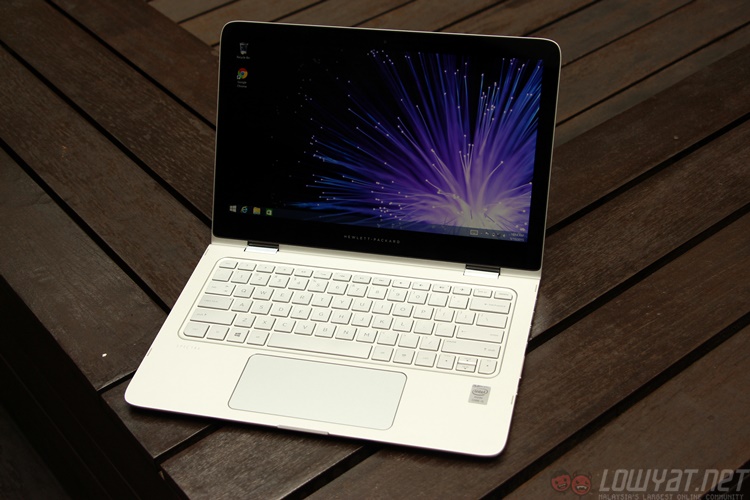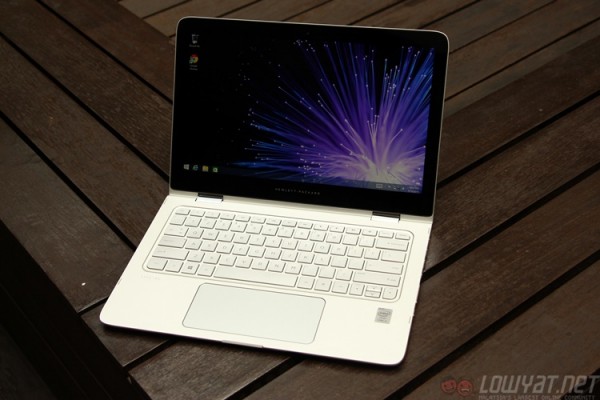
As a premium end laptop line, HP’s Spectre series has always upheld a certain level of classy aesthetics and design. The current HP Spectre x360 upholds the premium design promise, but for the first time also introduces an increasingly common folding hinge option with a touch display, offering users a new way to interact with the device.
SPECIFICATIONS
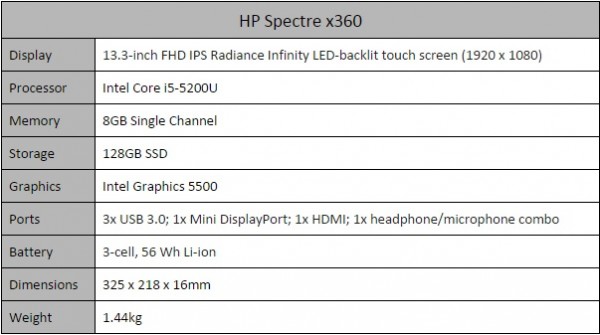
Our review unit comes with a fifth-generation Intel Core i5 processor with 8GB of RAM and 128GB of storage. The 13.3-inch Full HD display is touch-enabled, letting users flip the display and use it in four different modes: Laptop, Tablet, Stand and Tent – just like other laptops with a folding hinge design.
Unlike other laptops of this sort, the Spectre x360 is really light at just 1.44kg – and there’s an extra wide touch pad and three USB 3.0 ports.
DESIGN
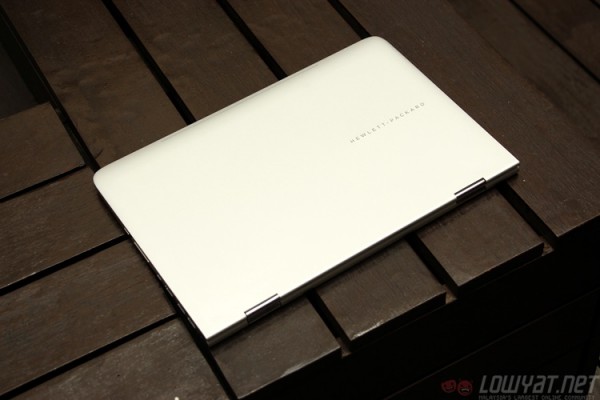
The Spectre x360’s silver steel design is reminiscent of previous models, including a tapered edges. One would not be wrong to say that it is almost inspired by the handsome looks of the MacBook Air. HP maintains a distinguished industrial design on the Spectre series, which can be regarded as one of the better designed and more premium-feeling Windows machines you can find today.
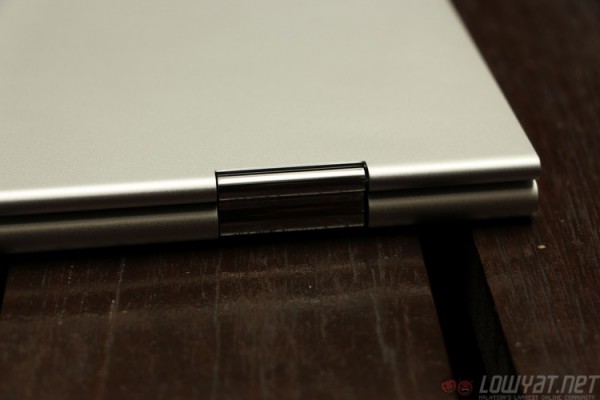
HP chose a simple double hinge design to allow the Spectre x360 its necessary flexibility. It gets the job done, and the hinge is much stronger and inspires a whole lot more confidence than older HP Spectre models. In fact, this a massive improvement as far as construction goes.
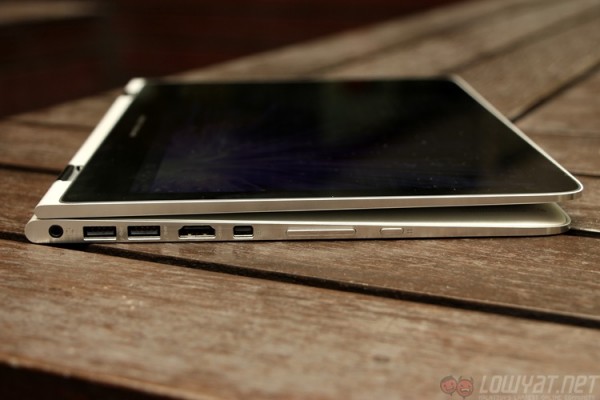
However, when used in tablet mode, I suspect HP’s design team may have thought it was still designing a regular clamshell laptop. It looks great when the laptop is used in a more traditional way, either closed or with the keyboard facing up. It doesn’t look as good with the laptop folded over in tablet mode. The two halves don’t fold flush against one another, leaving a gap at the end because of the tapered ends. It doesn’t affect how the tablet is used, but it looks quite unsightly.
USER EXPERIENCE
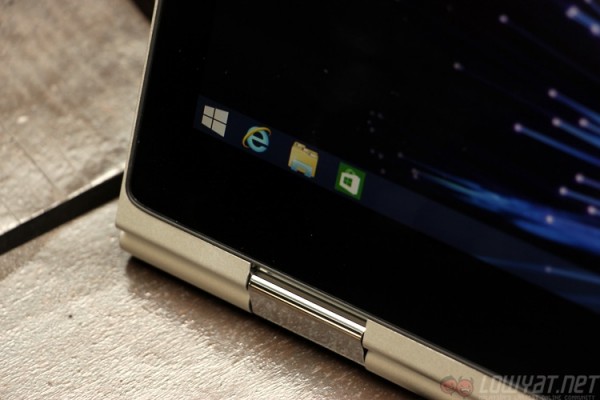
I had the privilege of traveling with the Spectre x360; a situation that put its abilities as a mobile working platform to the test. An emphasis has to be put on the “working” bit of the experience, considering that HP intended this machine for productivity and not much else. The hardware doesn’t quite allow for gaming, given the fact that it only has an integrated Intel GPU.
We should begin with the good points, where the Spectre x360 improves on its predecessors. The addition of a touch display and a 360-degree hinge offers a new way of using a Windows laptop, and allows HP to compete with other manufacturers already offering this option. Lenovo was on to something when it invented the Yoga devices, and it is no accident that every other manufacturer is integrating the design into their respective notebooks.
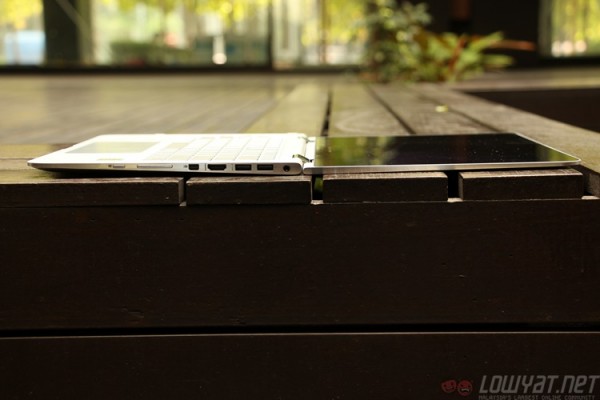
The 360-degree hinge allows the Spectre x360 to rest in the most comfortable position for the user. This is highly important because the keyboard can be uncomfortable to use at times. It is not entirely the keyboard’s fault for this, despite the key presses being unusually shallow even for a laptop. Rather, it is a problem with the lower edge of the chassis that is not rounded off. The edge digs into the wrists while typing, making it unpleasant to use for long periods, one of the occasions where ergonomics makes way for aesthetics. Being able to angle the display helps alleviate the problem somewhat.

That being said, the folding feature is not as useful as the designers want it to be. The common problem is that people who buy laptops are looking for just that. The size of the Spectre x360 is a bit bigger than what is comfortable in a tablet, meaning that the device will likely remain as a laptop for most of the time. It’s not that the Spectre x360 is bad as a tablet, but rather that the mode is unlikely to see much use – not to mention navigating Windows with a touch display isn’t really the most efficient thing to do. I personally only flipped it over just to see what it would look like. However, the versatility means that it can still fill the gap of a tablet when it needs to, such as using it in cramped spaces in Stand mode.
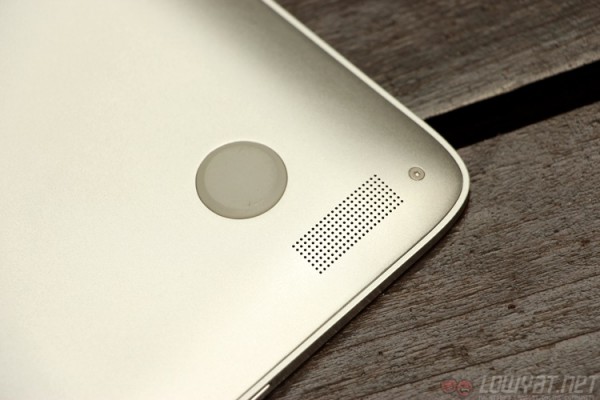
HP’s usual speaker technology doesn’t quite work with the Spectre x360. Like most laptops, it relies on the acoustic properties of tables to help amplify the audio. This works fine for times when there is a table and it is kept in laptop mode. It doesn’t quite work with the machine folded over. It could be that the curved edges on the top half diffuses the sound instead of redirected it back at the user. Either way, this results in audio that is barely audible from more than a metre away – nothing more than enough for just the user.
PERFORMANCE
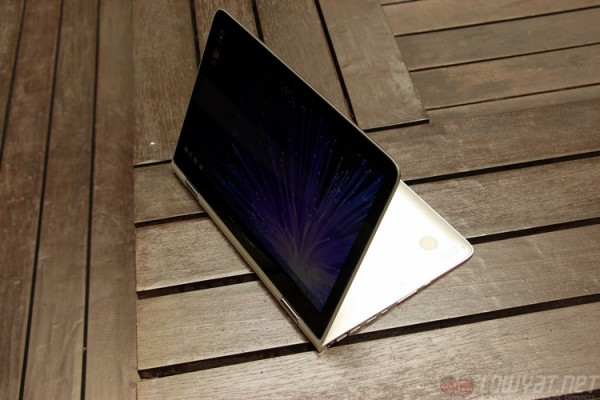

On the whole, the Spectre x360 does what it sets out to do. It works well for filing news stories on the go, which I speculate also means that it will be fine for people who need to edit documents and look at spreadsheets while out of the office. Otherwise, the HP Spectre x360 is not going to win any prizes for performance. Its 8GB RAM and 128GB storage are bog standard for laptops these days, and for its price especially, 128GB is rather tiny.
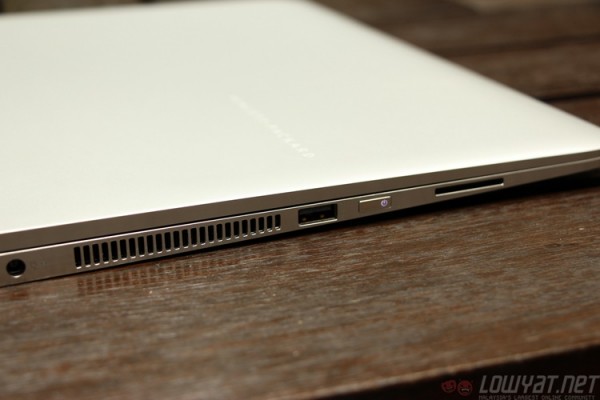
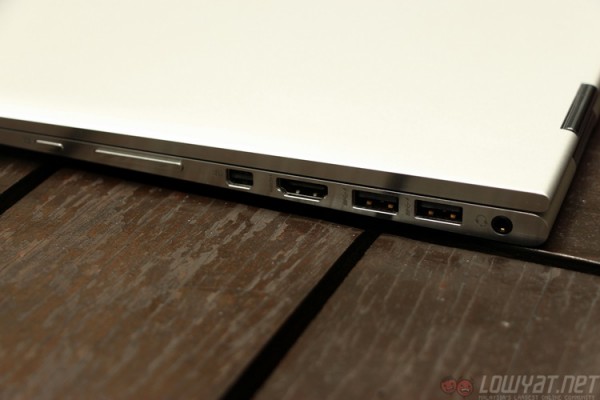
Gaming is limited to extremely low demand games, which excludes most of the triple A titles. This isn’t really a problem, since the tiny 13-inch display is not optimal for gaming anyway.
That being said, games like Minecraft, FTL: Faster Than Light, Hearthstone, and most other indie titles will run just fine on the Broadwell processor. It’s not great, but there is some entertainment value to the Spectre x360. Then again, some gamers get a lot of mileage out of just playing Minecraft.
BATTERY LIFE
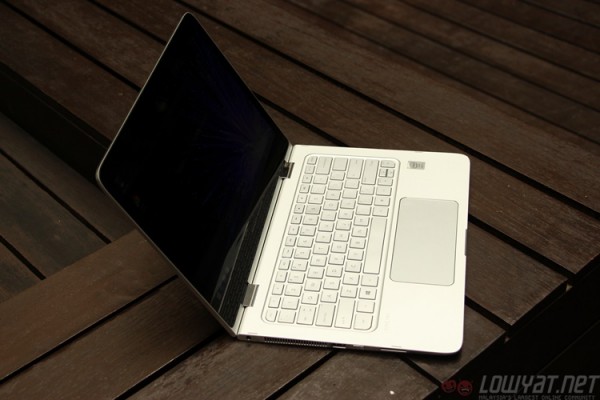
Battery life is where the Spectre x360 excels. We ran our usual test of looping a 1080p video at 50-percent brightness until the machine goes into standby mode – and we would like to point out that this is not an enjoyable experience when the number of hours runs into double digits.
Our test showed a run time of some 11 and a half hours before the Spectre x360 gave up. In normal usage, the laptop easily breezes through a working day (though things get a little worrying closer to 6pm). The Spectre x360 offers plenty of power for long working days, especially for times when there is a lack of opportunity to recharge. In other words, this is great for road warriors… or marathon Hearthstone sessions while stealing WiFi in Starbucks.
COMPETITION
As a premium productivity Ultrabook with a touch display and 360-degree hinge, the HP Spectre x360 actually does not have plenty of competition. While there are many convertible and hybrid laptops, few are in the same niche as the HP laptop.
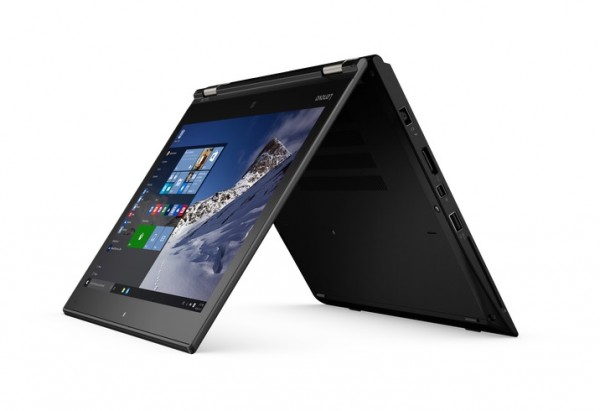
One such device is the Lenovo ThinkPad Yoga. Targeting the same niche market (though at a noticeably higher price range), the ThinkPad Yoga is another premium offering for road warriors and business users. Lenovo practically invented the folding hinge design, and knows how to make it work. In terms of hardware, the two devices are similar enough that users will not notice the difference. However, I will have to admit that Lenovo tends to have the advantage in terms of comfort. The Lenovo’s trademark chiclet style keyboard gives it a slight edge over the Spectre x360, not to mention the ThinkPad’s industrial-grade protection for its hardware. With a price of around RM5,000 (retail prices vary), the Spectre suddenly appears affordable.
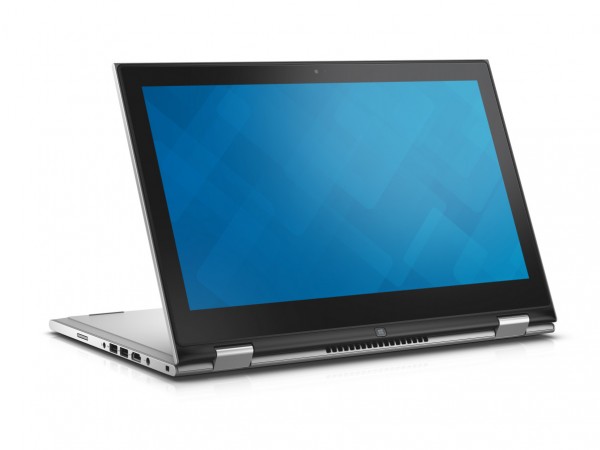
At the other end of the spectrum, there’s Dell’s Inspiron 7000 series. Designed as an entry-level hybrid laptop, what the Dell lacks in terms of aesthetics it makes up for in pricing. As is the case with laptops, the hardware is more or less similar, with the Inspiron sporting a newer Skylake processor but just a physical hard drive for RM3,699. The Inspiron is virtually the Spectre x360’s direct competitor, even if it is slightly thicker and heavier.
Conclusion
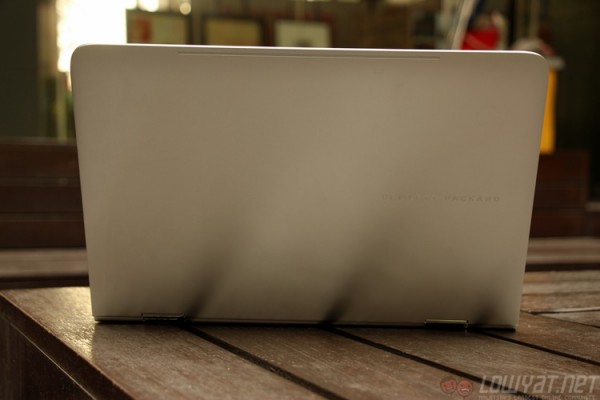
The HP Spectre x360 fills a specific niche, and does it well. While it does not have the benefit of the newer Skylake processor (though it’s likely HP will be fixing this in the near future), the Broadwell architecture is more than adequate for the purpose of whoever picks up this laptop.
This is a purely subjective matter, but for what it’s worth there are many machines that can achieve the same performance for less. That said, HP’s design acumen is something rarely seen on Windows machines, which might explain the slightly higher price point.
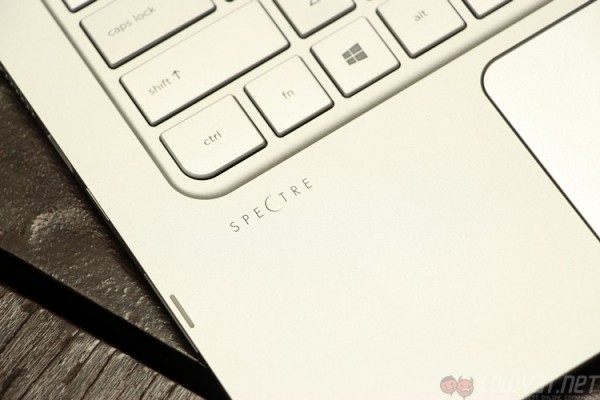
As far as value goes, you can do much worse than the Spectre x360. It is a great improvement over previous versions of the Spectre line, and that is a good thing. As far as convertibles go, I actually grew like the folding hinge feature. It is not terribly useful, but it is a nice trick and offers options when I need it. For purely work purposes, I would be hard pressed to recommend this laptop, as the price is a little higher than I would feel comfortable paying. Perhaps others might think otherwise.
Follow us on Instagram, Facebook, Twitter or Telegram for more updates and breaking news.


